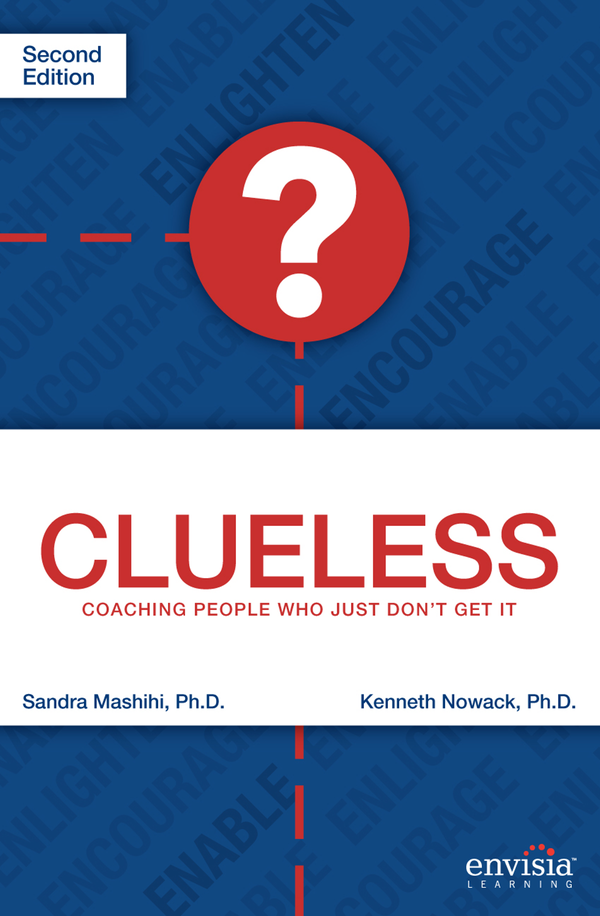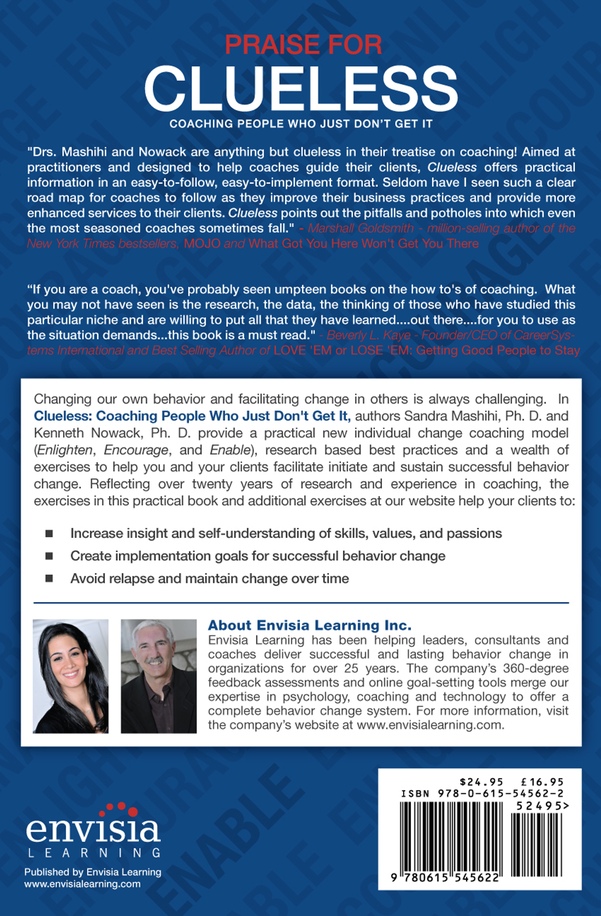
About the book
This book was written to help coaches initiate and sustain successful behavior change in the clients they work with. Authors Sandra Mashihi, Ph.D. and Kenneth Nowack, Ph. D. introduce a powerful model of behavioral change and include a wealth of useful strategies, research and practical tools for all types of coaches -- executive, career, lifestyle modification, and personal.
Read this book and you’ll discover the Enlighten, Encourage, and Enable model of behavior change that has driven successful interventions in organizations such as UC Irvine Medical Center, Time Warner Cable, Davita Inc., B&B Manufacturing, UCLA Anderson School of Management and the University of Iowa. Developed by Ken Nowack in over 20 years of work with thousands of participants, Enlighten, Encourage and Enable has proven reliable at increasing sustainable behavior change.
In this book and on the accompanying website, you’ll be introduced to 150 time-tested exercises that help coaches help clients to:
- Increase insight and self-understanding skills, values and passions
- Create implementation goals for successful behavior change
- Avoid relapse and maintain change over time.
Enlighten
In the Enlighten section of Clueless, the authors review different methods of helping your clients become more aware of their signature strengths, values, personality and development opportunities. They provide a detailed review of feedback methods including 360-degree feedback in order to maximize self-insight and awareness.
Encourage
In the Encourage section of Clueless you’ll learn about all the ways you can assess your clients’ motivation to implement behavioral change action plans. This section includes discussions of motivational interviewing techniques, behavioral change models, and skill building to facilitate clients’ readiness to want to implement their goals in a manner that can be measured and evaluated.
Enable
In the Enable section the authors introduce techniques and skills for clients to track and monitor progress on the implementation of their goals, build relapse prevention plans, and cultivate factors that support sustained change with colleagues, family members, partners and friends.
What others are saying:
"Drs. Mashihi and Nowack are anything but clueless in their treatise on coaching! Aimed at practitioners and designed to help coaches guide their clients, Clueless offers practical information in an easy-to-follow, easy-to-implement format."
Marshall Goldsmith - million-selling author of the New York Times bestsellers, MOJO and What Got You Here Won't Get You There"If you are a coach,...this book is a must read."
Beverly L. Kaye - Founder/CEO of CareerSystems International and Best Selling Author of LOVE 'EM or LOSE 'EM: Getting Good People to Stay"Clueless is a remarkably accessible and very practically-focused collection of resources for coaches. ... I highly recommend it"
Barry Bar-El - Director, Organization Development and Learning, Cedars-Sinai Medical CenterTable of Contents
Part I: Factors that Influence Behavioral Change
- Introduction to the Enlighten, Encourage, and Enable Behavioral Change Model
- Chapter 1: Coach Factors that Influence Behavioral Change
- Chapter 2: Client Factors that Influence Behavioral Change
- Chapter 3: Environmental Factors that Influence Behavioral Change
Part II: Enlighten
- Introduction: Why Enlightenment is Necessary for Behavioral Change
- Chapter 4: Different Domains of Assessment
- Chapter 5: Multi-Rater/360-Degree Feedback Systems
- Chapter 6: Mirror, Mirror, on the Wall: Matching Feedback to an Individual’s Self-Insight
- Chapter 7: Best Practices for 360-Degree Feedback
Part III: Encourage
- Introduction: Now That I know who I am—am I Really Ready for Change?
- Chapter 8: Assessing Readiness to Change Behavior
- Chapter 9: Facilitating Motivation to Change
Part IV: Enable
- Introduction: How do I go About Changing?
- Chapter 10: Goal Setting
- Chapter 11: Facilitating Goal Implementation
- Chapter 12: Measuring Goal Progress
- Chapter 13: Relapse Prevention
- Chapter 14: Building a Support Group
- Chapter 15: Approaches to Developing Talent
- About the Authors
Download a free chapter
Check out the Exercises



